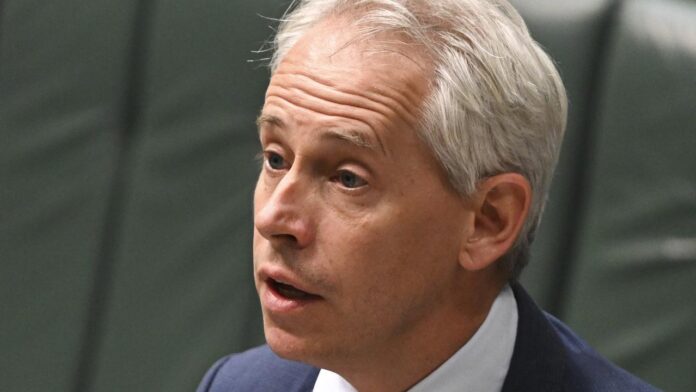[ad_1]
The parliament has passed an emergency bill that will restrict the movements of dozens of detainees, including convicted criminals, who have released after a High Court ruling.
This comes after the High Court last Wednesday found ongoing detention was unlawful if there was no prospect of detainees being deported.
So far, 84 people have been released into the community as a result of the decision, including convicted murderers, rapists, and pedophiles.
On Thursday, Labor agreed to the Coalition amendments to alleviate growing safety concerns among the community.
Released detainees will now be bound by curfews, ankle bracelets and mandatory reporting and face five years behind bars for breaching the conditions, with an “equivalent penalty” for “repeated cases of non-compliance”.
Immigration Minister Andrew Giles said community protection was the “fundamental priority” for the immediate measures, but acknowledged more work would need to be done after the Hight Court releases it’s reasoning.
“(The High Court’s) decision has of course, given implications for immigration compliance, and for the community safety obligations of the government to which this bill responds, noting that we still await reasons from the court and noting that further work will be required to be done in this regard,” he said.
“The Australian community expects that non-citizens who do not meet the requirements for migration to Australia will not undertake activities or engage in further offending that harms the community and could prejudice the Australian government’s ability to facilitate the removal from Australia.”
He also thanked the Coalition for their “constructive engagement” on the amendments.
“They strengthen the offence provisions and they also provide for more effective monitoring and management of individuals required to be released,” he said.
“(The amendments) allow the government to provide appropriate and proportionate monitoring of this cohort whilst they are required to be in the Australian community.”
Before the High Court’s decision, breaches of visas could be met with ongoing detention, but that is no longer possible for the detainees impacted.
Mr Giles said the government would continue to work through the implications of the High Court judgment.
“Further responses may be required once we have received the High Court’s reasons for decision,” he said.
Earlier on Thursday, Opposition Leader Peter Dutton accused the government of rushing through the legislation and slammed Prime Minister Anthony Albanese – again – for being overseas instead of being present to deal with the issue.
“These are people who are serious, violent, offenders. These are people who are of the worst character and they are non-citizens … These are people who do not deserve to live in our country,” Mr Dutton said.
“I think the Australian public is rightly outraged at a government that sees fit to let (these people) back out into the community.”
Mr Dutton warned that there was a “pipeline of 340 people and potentially more” who would be impacted by the High Court decision.
Mr Dutton also claimed the government had “taken a decision not to retain” the criminals when it was a High Court decision that the Commonwealth had no choice but to comply with.
He chastised the government for not having had draft legislation prepared ahead of the High Court’s decision.
After the Bill passed the House of Representatives, the government has worked with the Coalition to further strengthen the legislation.
Acting Prime Minister Richard Marles in question time on Thursday thanked Mr Dutton for the “spirit” in which he had engaged with the government on the legislation and outlined the six amendments Labor was now considering.
“The first is in relation to making curfews. The second is requiring visa holders not to perform work or participate in any regular organised activity that involves contact with children,” he said.
“The third is requiring visa holders to not go within 150m of a school, childcare centre or daycare centre.
“Four, ensuring that each day of a breach of these conditions be treated as a separate offence.
“The fifth is that if they are as a visa holder who has been convicted of an offence involving violence or sexual assault, allowing the minister to put in place a no-contact condition in respect of that individual.
“And the sixth is to establish mandatory minimum sentences in respect of those that breach this Bill.”
Despite the show of collegiance, the Coalition spent question time pushing the government over why legislation had not been considered before the High Court made its final decision.
Mr Dutton also continued his attack on Mr Albanese for leaving the country amid the work on legislation.
Greens senator Sarah Hanson Young also unleashed on the government for not including the minor party in negotiations to amendments to the migration law.
“There are other voices in this place,” Senator Hanson Young yelled in the Senate’s question time.
The Greens do not support the measures and have slammed the push as Mr Albanese’s “Tampa moment”.
Home Affairs Minister Clare O’Neil had earlier called on the parliament to “move quickly” on the issue.
She maintained that the government did not want the detainees to be released into the community but had no choice.
“I actually agree with the leader of the opposition … some of the people at the heart of this decision have committed horrible crimes, disgusting crimes. Crimes that no one in this parliament surely would accept,” she said.
“That is why we kept them in detention.”
[ad_2]
Source link


